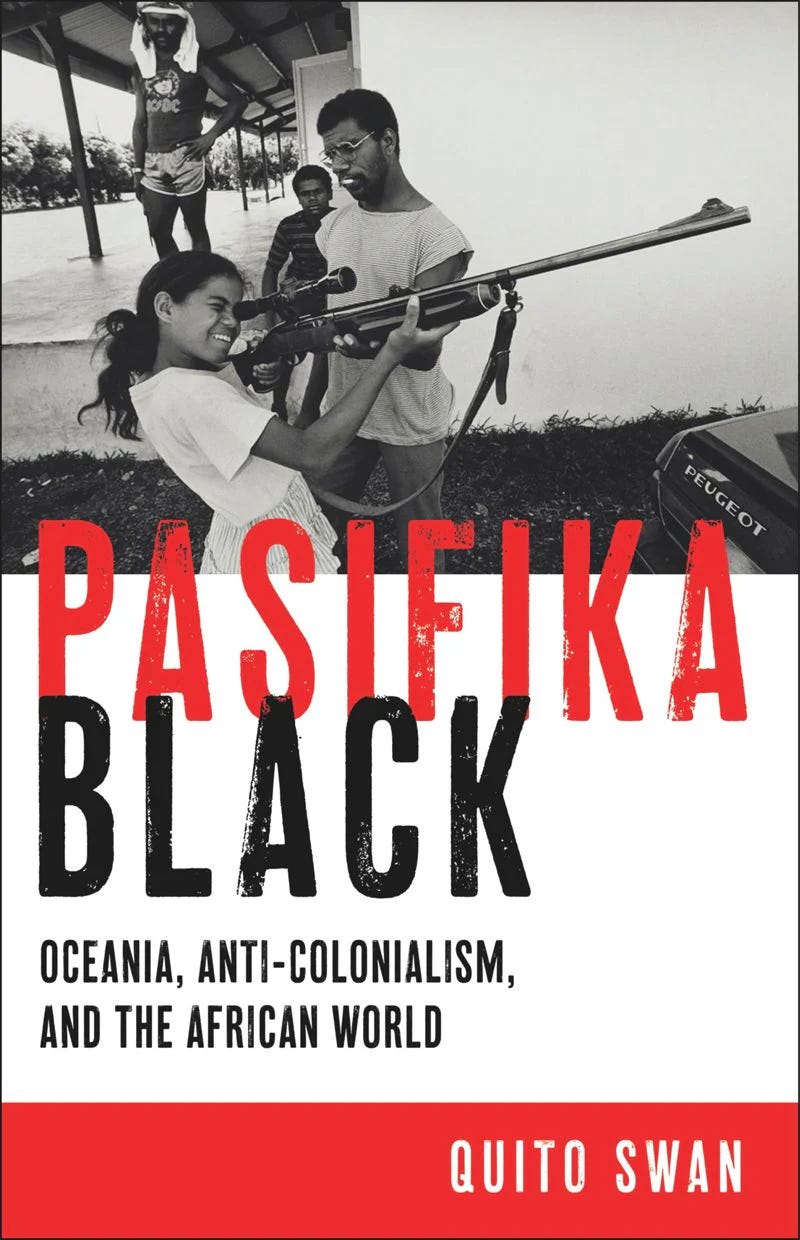A Love Letter from Melanesia
Reflections on solidarity as something that we do, not just something that we say + announcing the Pan African Summer Series at the Radical Hood Library/Noname Book Club HQ in LA.
In 1977, Aboriginal poet and liberation worker Oodgeroo Noonuccal was on her way back to Australia from FESTAC’77 in Lagos, Nigeria when her plane was hijacked by Palestinian freedom fighters. The group demanded the freedom of thirteen of their comrades who had been detained in Egypt, and threatened to kill the Dutch and Belgian passengers if two Palestinians who had led a similar protest hijacking were not freed.
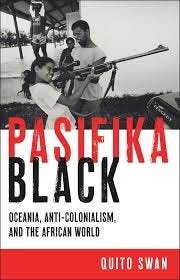
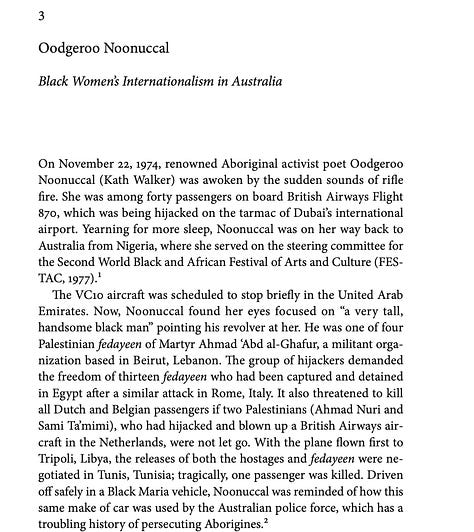

Noonuccal, who was the mother of Denis Walker – the founder of Australia’s Black Panther party – was held hostage by the hijackers for several days; during which time she intentionally endeavored towards building community with the Palestinian freedom fighters. (She reportedly encouraged them to put down their arms and join the FESTAC community instead). Upon learning that the group’s leader, Yussef, had abandoned his career as a pediatrician to join Palestine’s armed struggle, she penned what was effectively a love poem dedicated to Yussef – while still held hostage by him. Perhaps one of the most beautiful and remarkably complex expressions of solidarity-rooted-in-love that I’ve learned about in recent memory.
Yussef, (hi-jacker) by Oodgeroo Noonuccal
“Yussef, my son,
What do you do here,
With your dreamy eyes
That tell of moonlight
And sun
And the warm touch of a girl’s embrace?
The love you feel for children
Pours from your heart
And it’s easy to see
Since you wear it on your sleeve.
The soft lines around your mouth
Tell of endearments
You dare not speak.
Your tired eyes
Have seen blood and tears,
Fear and contempt.
I see you in the moonlight
Relaxing,
Contented in a girl’s embrace.
But reality clouds my vision;
For there you stand,
Erect,
Alert,
Caressing,
A repeating rifle,
In your desert-strong,
Sunburned hands.”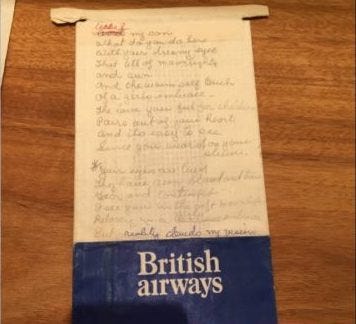

I came across this anecdote in Professor Quito Swan’s 2022 book Pasifika Black: Oceania Anti-Colonialism and the African World, which tells the story of the various Black liberation movements across the South Pacific (it is a must-read and I highly highly recommend that you purchase a copy). Coming across this book, via my dear comrade Shō Yamagushiku, author of Shima, was a large part of what inspired me to make a research pilgrimage of my own to Melanesia. As I write this letter now, I’m sitting in the home of two climate artist-organizers in Suva, Fiji, who I was introduced to via oceanic archivist Mere Nailatikau, who Kenyan musician Kamaru had planted the initial seed of connection with for me. The prevailing origin story here in Fiji is that their ancestors arrived from the shores of Lake Tanganyika, in East Africa, thousands and thousands of years ago (I had the privilege of visiting the First Landing village, Viseisei, a few days ago to hear this story first hand from its most proximate keepers). The ancestral spiral of a gift that it is for Kamaru, a fellow East African, to have bridged my way to finding pockets of home in these islands is far from lost on me.
The past few weeks here in Fiji and Vanuatu have been a domino effect of solidarities-turned-kinships beyond my wildest imagination. From reading about Shō’s grandparents who found their way to California from Okinawa via Mexico and New Caledonia in Shima; to stumbling upon one of Vanuatu’s most renowned sand-drawing artists, everything has illuminated itself as so intimately and fundamentally intertwined that it’s impossible to deny the demands of said connections.
In Oceania and Africa and Palestine and Turtle Island alike, indigenous people – in this big year of 2024 – are still fighting to break free from colonial rule.
Prior to arriving in Melanesia, I had intended on traveling to Noumea after having seen that it was the most accessible place to fly to from Fiji. By the time I had arrived to Nandi, the entire country of New Caledonia (which I will refer to from here on by its indigenous name, Kanaky), was on lockdown both digitally and physically – the airstrips shut, TikTok banned out of France’s reactionary imposition of a state of emergency in response to indigenous uprisings. Kanaky is one of five remaining French colonies in Oceania. The streets of Noumea are in flames, owing to country wide protests against a referendum that continues to threaten the sovereignty of Indigenous Kanaks on their own land. In Oceania and Africa and Palestine and Turtle Island alike, indigenous people – in this big year of 2024 – are still fighting to break free from colonial rule.
As I prepare to head to Australia on a brief stopover en route to the Kingdom of Hawai’i for the beginning of FestPac (a Pacific Ocean indigenous heritage festival that takes places every 4 years and welcomes delegates from all of Oceania’s island nations), I keep thinking back on a text that Shō sent me towards the beginning of this trip: “Who thought they could take a knife to the ocean? And why do so many of us still believe it to be so?”. His words Sufi-swirl hand in hand with a quote I came across via Yvonne Odhiambo-Owuor: “What the map cuts up, the story cuts across.” — Michel de Certeau.
Oceania is the last continent (save for Antarctica) that I had yet to visit. This trip has cemented so much – more than I can fit here, but much of which I look forward to finding more and more ways to share.
In a little over a week from now, I’ll be holding the inaugural session of the Pan African Summer School I’m facilitating from June - July at the Radical Hood Library in South Central, LA. Developing this series alongside Noname and the team over at Noname Book Club has been such a nourishing convergence of years worth of research pilgrimages and curiosities and all the solidarities that have blossomed out of them. I hope to see those of you who are in or passing through LA in some of the sessions. The Summer School is free / in-person only, and you can register at this link: https://nonamebooks.com/Book-Club-HQ. Check out the fuller session descriptions for the first three weeks below (the third week, June 23rd, is dedicated to Black Pasifika). I’ll be sharing more context, including each week’s reading/viewing/listening syllabus as the summer school goes along.
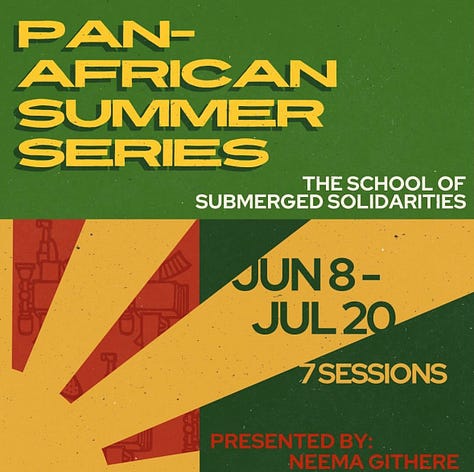
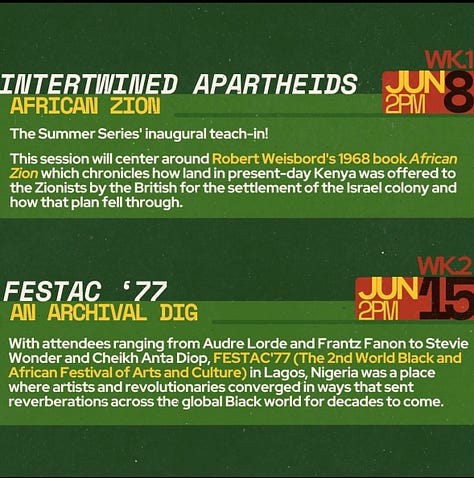
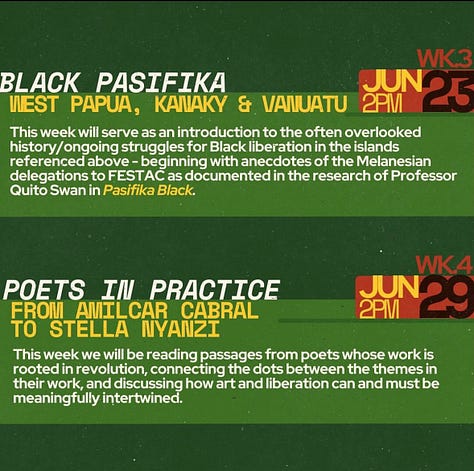
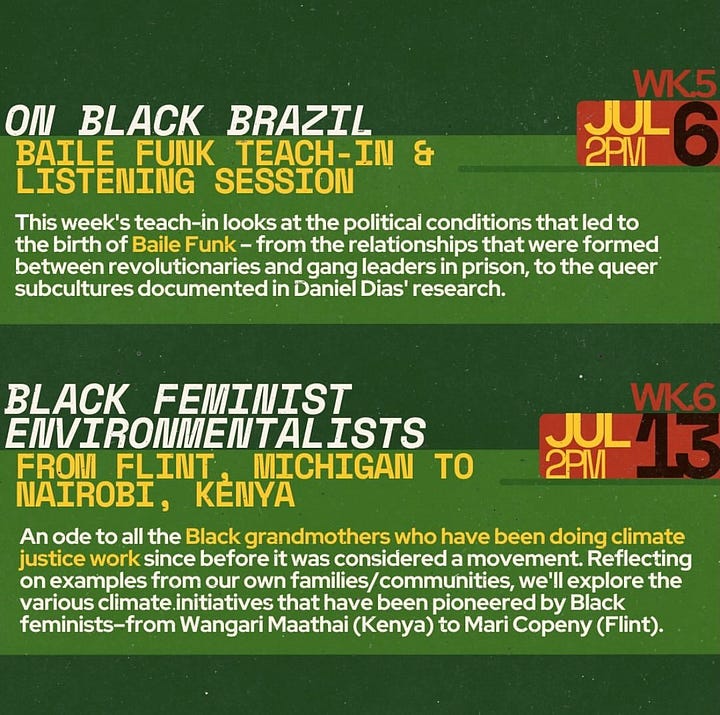

Intertwined Apartheids: African Zion Teach-In (June 8th)
The Summer Series' inaugural teach-in centers around Robert Weisbord's 1968 book African Zion which chronicles how land in present-day Kenya was offered to the Zionists by the British in 1906 for settlement of their Israel colony and the reasons that plan fell through. We will also explore the significance of the state of Israel's founding in 1948 coinciding with the beginning of apartheid in South Africa that same year.
FESTAC ‘77, The 2nd World Black and African Festival of Arts and Culture: An Archival Dig (June 15th)
With attendees ranging from Audre Lorde and Frantz Fanon to Stevie Wonder and Cheikh Anta Diop, FESTAC'77 in Lagos, Nigeria was a place where artists and revolutionaries converged in ways that sent reverberations across the global Black world for decades to come. Through looking at archival documents and footage, we will explore how understandings around Pan-Africanism on a global scale were formed through festivals like FESTAC, and what the encounters that took place here teach us about solidarity between continents and between disciplines.
Pasifika Black Teach-in: West Papua, Kanaky, Fiji and Vanuatu (June 23rd)
Despite the fact that Oceania is home to millions of Afro-indigenous people–from Papua New Guinea to Vanuatu–many people often overlook this region in their discussions about Pan-Africanism. This week will serve as an introduction to the history/ongoing struggles for Black liberation in these islands - beginning with anecdotes of the Melanesian delegations to FESTAC as documented in the research of Professor Quito Swan in Pasifika Black, followed by a screening of and discussion about "Forgotten Bird of Paradise," which documents West Papua's fight for independence & short debrief on the uprisings in Kanaky.
I hope to see and/or hear from some of you soon (if you’ll be at FestPac next week, or know anyone who will be there - please send a message my way!)
With Love from Fiji,
💚 Neema




